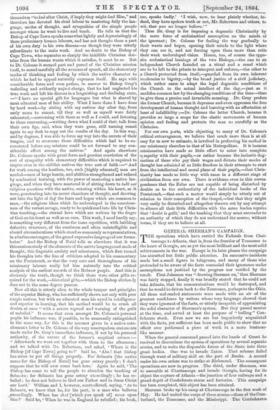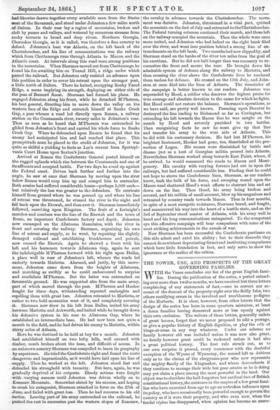GENERAL SHERMAN'S CAMPAIGN.
THE operations which have carried the Federals from Chat- tanooga to Atlanta, that is, froth. the frontier of Tennessee to the heart of Georgia, are as yet the most brilliant and the most solid achievements in the war. Except in its later phases the campaign has attracted but little public attention. Its successive incidents made but a small figure in telegrams, and many of those who pretended to be aware of the facts concealed their ignorance under assumptions not justified by the progress nor verified by the result. First Johnston was "drawing Sherman on," then Sherman was fairly stopped, finally it was broadly stated that he could not take Atlanta, that his communications would be destroyed, and that he would be driven back to the Tennessee, perhaps to the Ohio. All these unfounded statements were made with an air of the greatest confidence by writers whose very language showed that they were ignorant of the facts, or utterly incapable of appreciating the solid character of Sherman's system. But they passed muster at the time, and served at least the purpose of " bulling " Con- federate stock. Even now we are but imperfectly acquainted with the facts, yet sufficient has been made public to show that no officer ever performed a piece of work in a more business- like manner.
When the general command passed into the hands of Grant he resolved to discontinue the system of operations by several separate armies, and to unite the disposable forces of the State into three great bodies. One was to invade Texas. That scheme failed through want of military skill on the part of Banks. A second under his own orders was to strike at Richmond. The consequent operations are now in progress. The third, under Sherman, was to assemble at Chattanooga and invade Georgia, having for its object the capture of Atlanta —the junction of four railways and a grand• depot of Confederate stores and factories. This campaign has been completed, this object has been attained.
Sherman broke up his camp at Chattanooga in the first week of May. He had united the corps of three armies—those of the Cum- berland, the Tennessee, and the Mississippi. The Confederates had likewise drawn together every available man from the States west of the Savannah, and stood under Johnston a few miles north of Dalton. In their rear lay a region of mountains, broken and cleft by passes and valleys, and watered by numerous streams from rocky torrents to broad and deep rivers. Northern Georgia, Cherookee Georgia, as it is called, was therefore a fine country to defend. Johnston's base was Atlanta, on the left bank of the Chattahoochee, and his line of communications was the railway which from Chattanooga runs through Atlanta to Macon and the Atlantic coast. At intervals along this road were strong positions in the Mountains. When Sherman moved out from Chattanooga he found his foe awaiting him on Tunnel Hill, a ridge under which passed the railroad. But Johnston only resisted an advance upon this position in order to cover his retreat upon the stronger post, a little north of Dalton. There he halted, occupying Rocky Faced Ridge, a name implying its strength, deploying on either side of the pass of Buzzard Roost. Sherman had formed his plans. He engaged Johnston along his front, while he detached M'Pherson, his best general, directing him to move down the valley on the western face of the Ridge and entrench himself at Snake Creek Gap, a pass whence a road led directly upon Resaca, a railway station on the Coostanaula river, twenty miles in Johnston's rear. Then as boon as he heard that M'Pherson was entrenched he glided from Johnston's front and carried his whole force to Snake Creek Gap. When he debouched upon Resaca he found that his enemy had anticipated him and had reached that place. This promptitude must be placed to the credit of Johnston, for it was quite as skilful a yielding to facts as Lee's retreat from Spottsyl-
vania Court House upon Sexton's junction. •
Arrived at Resaca the Confederate General posted himself on the rugged uplands which rise between the Coostanaula and one of its affluents and accepted battle. For two days he stood up against the Federal onset. Driven back further and further into the angle, he saw at once that Sherman by moving upon the river below Resaca would coop him up and compel him to surrender. Both armies had suffered considerable losses—perhaps 5,000 each— but relatively the loss was greater to the defenders. To extricate himself from ground where he was penned up and where his line of retreat was threatened, he crossed the river in the night and fell back upon the Etowah, and then over it. Sherman immediately followed, marching upon Kingston. The fruit of a fortnight's marches and combats was the line of the Etowah and the town of Rome, an important Confederate factory and depOt. Johnston now encamped on the Allatoona Mountains, with the river in front and covering the railway. Sherman, organizing his own dine of retreat and supply, as he went, by repairing the slightly damaged railroad and establishing blockhouses and patrols, now crossed the Etowah. Again he showed a front with his left and his horsemen towards Allatoona Gap, again he sent the indefatigable M'Pherson forward with his right upon Dallas, a place well in rear of Johnston's left, whence the roads led easterly towards Marietta. Alarmed, and justly, by this move- ment, Johnston came down from the heights of Allatoona, and marching as swiftly as he could endeavoured to surprise and annihilate MTherson. But the latter was entrenched on favourable ground. He was supported also from the main army, part of which moved through the pass. M'Pherson and Hooker fought for three days, withstanding repeated onslaughts and repelling them with great loss. Johnston retreated to Marietta, or rather to two bold mountains west of it, and completely covering it Sherman now drew in his left from Dallas, united his army between Marietta and Ackworth, and halted while he brought down his defensive system in his rear to Allatoona Gap, where he established an intermediate base. He had now been not quite a month in the field, and he had driven his enemy to Marietta, within thirty miles of Atlanta.
Here he was destined to be held at bay for a month. Johnston had established himself on two lofty hills, well covered with timber, much broken about the base, and difficult of access. In an unknown country Sherman was compelled to learn its geography by experience. He tried the Confederate right and found the route dangerous and impracticable, as it would have laid open his line of supply. Then he worked at the left. Johnston stood fast and defended his stronghold with tenacity. But here, again, he was gradually deprived of his outposts. Bloody actions were fought with varying success until Johnston was driven wholly on to Kenesaw Mountain. Somewhat elated by his success, and hoping to crush his antagonist, Sherman attacked in force on the 27th of June, and failed with great loss. Then he had recourse to his old tactics. Leaving part of his army entrenched on the railroad, he pushed the rest in succession past the western slopes of Kenesaw,
the cavalry in advance towards the Chattahoochee. The move- ment was decisive. Johnston, threatened in a vital part, quitted the mountain on the 2nd of July and retreated to the Chattahoochee. The Federal turning columns continued their march, and those left on the railway occupied the mountain. Then the whole were once more united, and Johnston who had halted on the right bank filed over the river, and went into position behind a strong line of en- trenchments on the left bank. Two months had now slipped by, and Sherman stood on the banks of the river ten miles from the goal of his exertions. But he did not halt longer than was necessary to re- connoitre the front and secure the rear. He brought down his admirable system of defence along the railway to Marietta, and then crossing the river above the Confederate lines he rendered them useless for defence. He crossed on the 11th July, and John- ston at once filed into the lines of Atlanta. The remaiuder of the campaign is better known to our readers. Johnston was superseded by Hood, a soldier who deserves the highest praise for true courage and absolute devotion to the cause for which he fights. But Hood could not restore the balance. Sherman's operations, as we have said, are pretty well known. Pouncing upon Decatur he destroyed the line leading to Richmond as far as Covington, but extending his left towards the Macon line he was caught on the march by Hood and severely punished in two battles. Then recognizing facts he saw he must give up that line and transfer his army to the west side of Atlanta. This he did with his customary decision. He had lost M'Pherson, his brightest lieutenant, Hooker had gone, too, dissatisfied at the pro- motion of Logan. His means were diminished by battle and disease just as a host of Georgian militia poured into Atlanta. Nevertheless Sherman worked along towards East Point, where, if he arrived, he would command the roads to Macon and Mont- gomery. His cavalry with varying fortune had cut in upon the railways, but had suffered considerable loss. Finding that he could not hope to storm the Confederate lines, Sherman, as our readers know, took the bulk of his force, and sweeping round upon the Macon road shattered Hood's weak efforts to obstruct him and sat down on the line. Then Hood, his army being broken and severed, and his militia of small account, blew up his magazines and retreated by country roads towards Macon. Thus in four months, in spite of a most energetic resistance, Sherman bored, and fought, and manoeuvred his way into the heart of a hostile state, and on the 3rd of September stood master of Atlanta, with his army well in hand and his long communications unimpaired. To the competent eye this offensive campaign will bear comparison with some of the most striking achievements in the annals of war.
Now Sherman has been successful the Confederate partizans on this side admit and extol his ability ; but to their discredit they cannot do sowithout depreciating Grant and instituting comparisons which have little foundation in fact, and only serve to show the ignorance or the malice of the critics.































 Previous page
Previous page